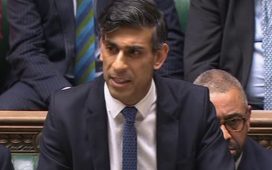When Jess Phillips pulled out of Labour’s leadership contest earlier this week she reduced the breadth of the contest’s factional spectrum, by vacating the spot reserved for a vocal opponent of Jeremy Corbyn. Not actually a Blairite – having quit the party during Tony Blair’s era – the Birmingham MP is often labelled as such because her closest colleagues can be fairly described that way.
Candidates may prefer not to acknowledge it but the spectrum matters a great deal in these internal elections – and Phillips was thought to be at one end of it. Her departure will shift the dynamics of the race, bringing the potential of risk or reward to the four remaining contenders.
When Phillips dropped out, she endorsed Lisa Nandy as her first preference choice and Keir Starmer as her second. Her support for Nandy makes sense because Phillips had talked about “passing the mic” to boost women’s representation, and said failing to elect a woman as Labour’s next leader would be “embarrassing”. Plus, having argued that some of her rivals had “kept quiet” on Labour’s handling of antisemitism, the former candidate needed to pick a fellow backbencher who had consistently voiced concerns in parliament as well as when pushed to do so in interviews.
Labour members, who make up the majority of the selectorate in this contest, are largely on the left of the party. Recent polling found that Corbyn is their favourite leader of the last century, with Ed Miliband close behind, while most view Tony Blair unfavourably. For these reasons, and the general feeling that the membership is looking for a higher level of competence rather than a decisive shift away from radical policymaking, there was an idea that whomever Phillips endorsed would be receiving a kiss of death. And yet her declaration for Nandy seems to have barely registered.
That is partly because Nandy has changed her message. At the start of the campaign, she was asked on Pienaar’s Politics which policies she would scrap from the 2019 manifesto. “First of all, I wouldn’t have been offering free broadband,” she replied, with remarkable honesty. Left Twitter was not pleased at all. Did she learn from that incident? It would appear so from the first party hustings, when her reply changed to: “I struggled to sell the package.” She has settled on the member-friendly conclusion that it was not the individual policies at fault but the overloaded nature of Labour’s manifesto.
Nandy has also sought to distance herself from Blue Labour, an organisation that advocates social conservatism, to which she was linked after attending a conference in 2016. She went so far as to dedicate an entire speech to her new-found support for freedom of movement. While sticking with her “towns like mine” mantra, she has successfully reasserted herself as the “soft left” candidate and carved out a unique space in the contest. She can attract a wide range of members: Corbynites who didn’t like the second referendum policy; those persuaded that she is best placed to win back leavers and town-dwellers; members of soft-left groups such as Open Labour, who are pro-EU but looking for a strong commitment to working with members of all factions across the party; young activists who simply appreciate a strong meme game.
Starmer must have been relieved when he only came second in the preferences expressed by Phillips. As a more recently elected MP than Nandy, and someone not involved in setting up groups such as Labour Together, his place on Labour’s factional spectrum is less obvious. We know that Starmer is a London representative who backed the leadership challenger, Owen Smith, in 2016 and later pushed for a more anti-Brexit stance. He is often described as “sensible” by so-called moderates as a synonym for Corbyn scepticism. Considering this context and his desire to win votes from the Corbynite left, he could have been badly hurt by a Phillips endorsement.
Starmer set out his stall early, however, and he pitched it carefully. His slogan, “Another future is possible”, is not particularly meaningful. Yet it conveys hope, and it is suggestive of both the anti-Brexit campaign group, Another Europe is Possible, and a phrase used by John McDonnell, “Another world is possible”. He has hired the unrelated Fletchers, Simon and Kat, who worked on Corbyn’s leadership campaigns, but also Matt Pound of “old right” group Labour First. This is all part of a balancing act being performed by Starmer, which allowed him to build a broad coalition of support early on. The question is whether it will hold.
Rebecca Long-Bailey has the tricky job of denying that she is the “continuity Corbyn” candidate while firming up the votes of Corbyn supporters. Rating the outgoing leader “10 out of 10” was a blunder that cost her local party nominations and votes from members who want evidence that the next leader will not fall into media traps. Since then, Long-Bailey has developed a strategy focused on enthusing her base while creating dividing lines. Her announcement that she backs open selections – the rule under which sitting MPs would go through a full selection process before every general election – baffled those who saw it as a move that would alienate those outside the left of the party, when she needs to gain a broader base of support. But its purpose was to motivate activists while putting forward a radical left-wing agenda that Starmer, it is assumed, cannot match.
So what does this all mean for the makeup of the leadership contest’s political spectrum? Nandy is moving leftwards and gathering momentum. Starmer established an early lead and has been steadily gathering more nominations than any other candidate. Long-Bailey, firmly on the left, is striving to squeeze Starmer’s vote and consolidate her own. It is actually Emily Thornberry, the contender who struggled to get enough MP and MEP nominations in the first phase, who most closely resembles Phillips now.
Thornberry benefited most when Phillips – as the only other candidate needing to secure her place on the ballot via local party nominations – left the contest and provided room to breathe. Her pitch also sounds remarkably similar: I’m the charismatic one, and Boris Johnson doesn’t like me. Pressed for a policy priority by Andrew Neil, she even came up with the same answer as Phillips: social care. The narrowed field means Thornberry should be able to enter the next stage of the process – but it also risks placing her at an end of Labour’s factional spectrum that is not a popular place to be right now.
• Sienna Rodgers is editor of LabourList














